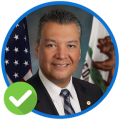Elect Phil Arballo to push CD-13 in the right direction.
The Position
Congressmembers represent and advocate for the needs of their district constituents at the United States Capitol. They are responsible for creating, debating, and voting on legislation that addresses issues within their district.
The United States is divided into 435 congressional districts, each with a population of about 710,000 individuals. Each district elects a representative to the House of Representatives for a two-year term. California has 53 congressional representatives. There is no term limit for this position.
The District
California’s 13th Congressional District includes parts of Fresno, Merced, and Stanislaus Counties. Democrats typically hold this district. Of the registered voters in this district, 29% are Republican and 42% are Democrat, and the district’s demographic breakdown is 50% Latino, 6% Asian, and 4% Black. This district is considered to be one of the 16 strong Latino seats in the California congressional delegation. After the 2021 redistricting process, CD-13 is 4% more Republican and 2% less Democratic than it was during the 2020 general election cycle. The most recent election results show that CD-13 voted for Joe Biden for president in 2020 by 20 points and Gavin Newsom for governor in 2018 by 12 points. Under newly drawn district maps, District 13 is positioned as an open seat.
The Race
There are five candidates running for this seat, including Democrat Phil Arballo and Democrat Adam Gray, as well as Republicans David Giglio, Diego Martinez, and John Duarte. Arballo’s campaign has raised $1,140,885 and is not funded by fossil fuel money, police money, or real estate money. Giglio’s campaign has not committed to refusing fossil fuel, police, real estate, or corporate PAC money. He is also funded by WinRed, a Republican PAC backed by Donald Trump that came under fire in 2021 for misleading donors, marking their one-time donations as recurring. As of April 2022, neither Gray, Martinez, nor Duarte have filed any fundraising receipts for the current election cycle. Gray is a member of the State Assembly who has a lifetime Courage Score of 20 out of 100 and has received significant contributions from oil and gas, real estate, and law enforcement.
The Recommendation
Phil Arballo, a small-business owner, was born in Fresno and has lived in Fresno his whole life. According to campaign materials, he is running for election to level the playing field for working people, support local farming communities, and create pathways to well-paying jobs. Arballo has run for Congress previously in what was District 22. He lost to Republican incumbent Devin Nunes by only 8 points in his first race and in a much redder district.
Arballo is a businessman and financial advisor. He serves on the Central California Hispanic Chamber of Commerce, and chairs the Bicycle and Pedestrian Advisory Committee. His platform centers on policies regarding farming communities that make up much of the Central Valley, including innovation and job training related to agriculture and addressing problems concerning drought. He also touts progressive policies like universal health care, pathways to citizenship for Dreamers and other undocumented people, voter-protection laws, and campaign-finance reform.
Arballo has the endorsement of many groups in the district, including SEIU CA, Madera Democratic Club, and San Joaquin Democratic Club. Based on our analysis, Arballo’s track record and policy positions demonstrate that he will be a progressive champion for the constituents of CD-13 and will govern effectively in the best interest of this diverse district.
Elect Phil Arballo to push CD-13 in the right direction.
The Position
Congressmembers represent and advocate for the needs of their district constituents at the United States Capitol. They are responsible for creating, debating, and voting on legislation that addresses issues within their district.
The United States is divided into 435 congressional districts, each with a population of about 710,000 individuals. Each district elects a representative to the House of Representatives for a two-year term. California has 53 congressional representatives. There is no term limit for this position.
The District
California’s 13th Congressional District includes parts of Fresno, Merced, and Stanislaus Counties. Democrats typically hold this district. Of the registered voters in this district, 29% are Republican and 42% are Democrat, and the district’s demographic breakdown is 50% Latino, 6% Asian, and 4% Black. This district is considered to be one of the 16 strong Latino seats in the California congressional delegation. After the 2021 redistricting process, CD-13 is 4% more Republican and 2% less Democratic than it was during the 2020 general election cycle. The most recent election results show that CD-13 voted for Joe Biden for president in 2020 by 20 points and Gavin Newsom for governor in 2018 by 12 points. Under newly drawn district maps, District 13 is positioned as an open seat.
The Race
There are five candidates running for this seat, including Democrat Phil Arballo and Democrat Adam Gray, as well as Republicans David Giglio, Diego Martinez, and John Duarte. Arballo’s campaign has raised $1,140,885 and is not funded by fossil fuel money, police money, or real estate money. Giglio’s campaign has not committed to refusing fossil fuel, police, real estate, or corporate PAC money. He is also funded by WinRed, a Republican PAC backed by Donald Trump that came under fire in 2021 for misleading donors, marking their one-time donations as recurring. As of April 2022, neither Gray, Martinez, nor Duarte have filed any fundraising receipts for the current election cycle. Gray is a member of the State Assembly who has a lifetime Courage Score of 20 out of 100 and has received significant contributions from oil and gas, real estate, and law enforcement.
The Recommendation
Phil Arballo, a small-business owner, was born in Fresno and has lived in Fresno his whole life. According to campaign materials, he is running for election to level the playing field for working people, support local farming communities, and create pathways to well-paying jobs. Arballo has run for Congress previously in what was District 22. He lost to Republican incumbent Devin Nunes by only 8 points in his first race and in a much redder district.
Arballo is a businessman and financial advisor. He serves on the Central California Hispanic Chamber of Commerce, and chairs the Bicycle and Pedestrian Advisory Committee. His platform centers on policies regarding farming communities that make up much of the Central Valley, including innovation and job training related to agriculture and addressing problems concerning drought. He also touts progressive policies like universal health care, pathways to citizenship for Dreamers and other undocumented people, voter-protection laws, and campaign-finance reform.
Arballo has the endorsement of many groups in the district, including SEIU CA, Madera Democratic Club, and San Joaquin Democratic Club. Based on our analysis, Arballo’s track record and policy positions demonstrate that he will be a progressive champion for the constituents of CD-13 and will govern effectively in the best interest of this diverse district.






